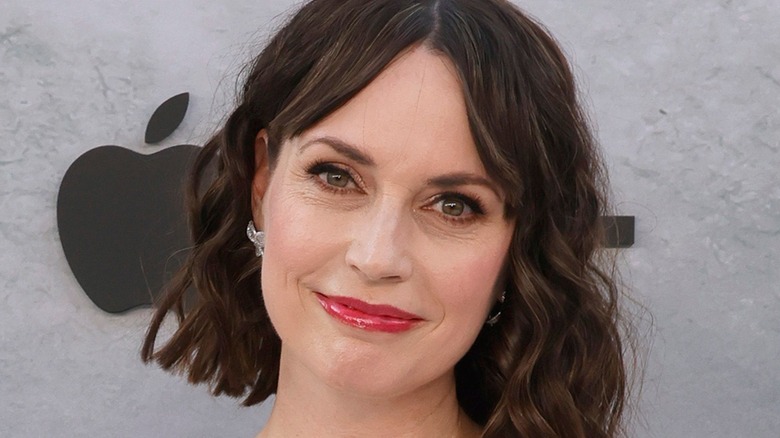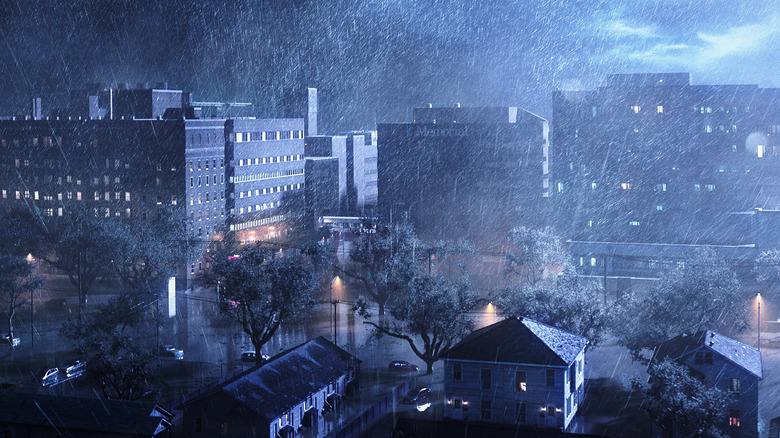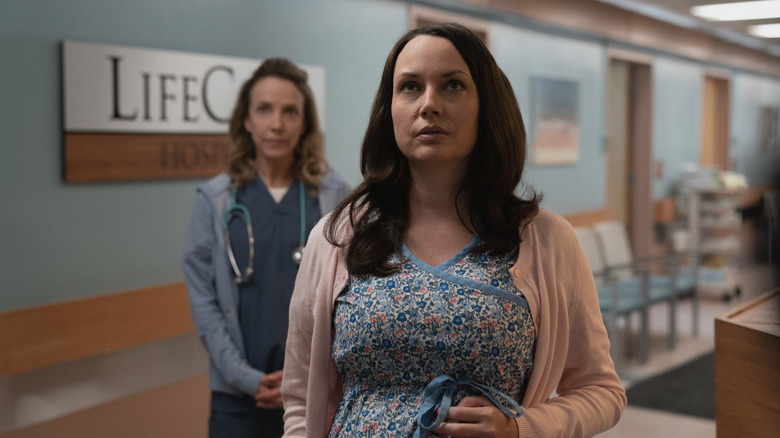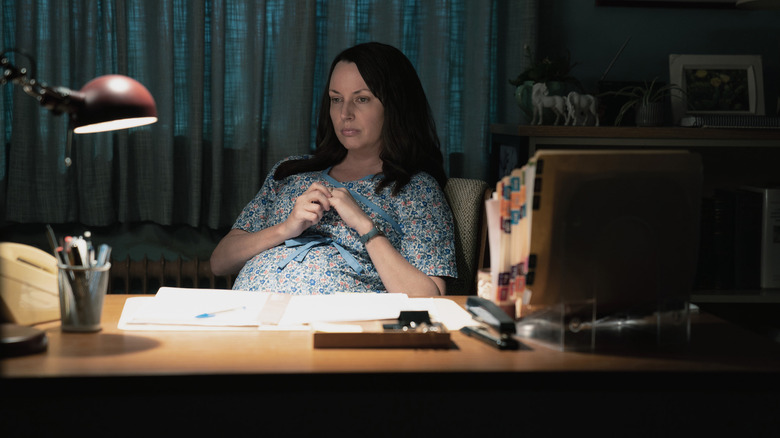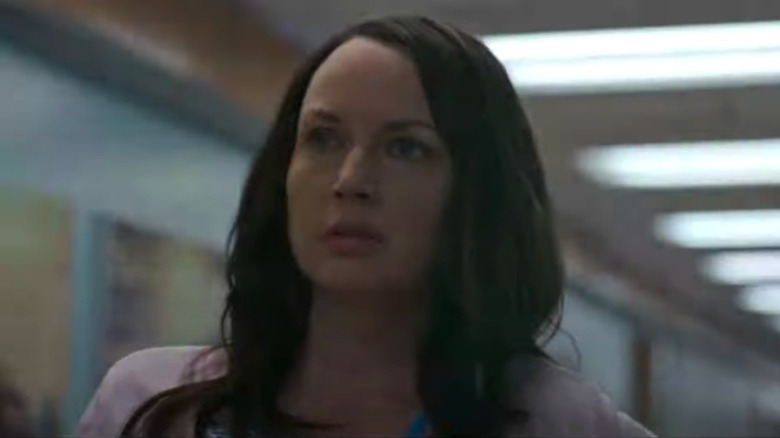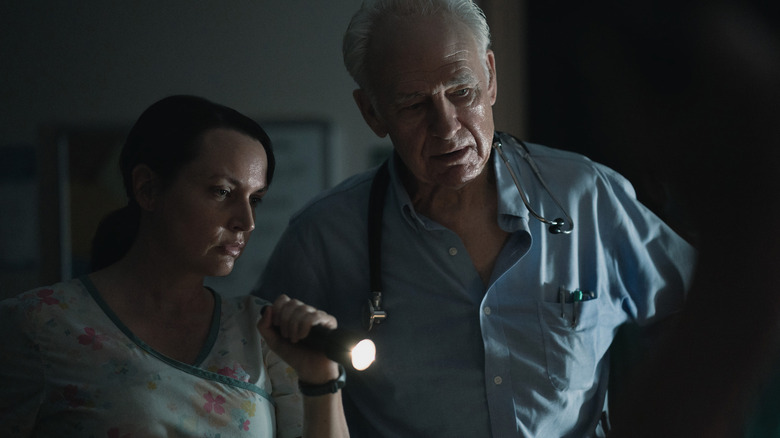Julie Ann Emery On The Highs And Lows Of Five Days At Memorial — Exclusive Interview
Hurricane Katrina was one of the worst natural disasters in American history. Among those weathering the storm were the staff and patients at Memorial Hospital in New Orleans, whose harrowing story is told in Apple TV+'s limited series "Five Days at Memorial." The doctors and nurses at the hospital thought they'd gotten through the hurricane relatively unscathed; however, in Katrina's aftermath, the streets around the hospital started to flood, the power failed, and the temperature soared. As a result, conditions rapidly deteriorated and evacuation efforts were slow and difficult.
In particular peril were the patients at LifeCare, an independent facility within Memorial Hospital that treated people who were especially sick and debilitated. During the crisis, LifeCare was under the oversight of Diane Robichaux. Diane, who's played by Julie Ann Emery in "Five Days at Memorial," also happened to be heavily pregnant at the time yet still stayed with her patients as long as possible while doing everything she could to get them safely evacuated. Emery, who's appeared in shows like "Preacher," "Better Call Saul," and "Bosch," imbues Diane with a caring determination that makes her attempts to help her patients during the emergency especially distressing. In an exclusive conversation with The List, Emery discussed the highs and lows of filming "Five Days at Memorial," including how the mistakes of Katrina have echoes in the COVID-19 pandemic, the way her character's pregnancy impacted her performance, and why she enjoyed filming the series despite its heavy subject matter.
Why Hurricane Katrina remains relevant today
"Five Days at Memorial" tells such a difficult story, and your character is put in this incredibly challenging position. Why did you want to portray her?
We began filming when we were just coming out of the lockdown phase of the pandemic, and the idea of telling a story that matters in the world that might help us examine how we respond to these moments and do better in the future, that was incredibly appealing to me. At the same time, filming at that phase of the pandemic made everything richer, definitely deeper and more meaningful, and in some ways personally depressing because we see this repeating itself over and over again.
[Executive producer, writer, and director] John Ridley quoted Mark Twain at our very first cast meeting. He said, "History doesn't repeat itself; it rhymes." It does rhyme, and boy, have we seen that over and over again, both in terms of how we respond to a disaster and how we tend to abandon our healthcare workers and just assume that they're okay, or not get them the resources that they need. Sadly, Katrina happened 17 years ago but is insanely relevant in our world right now. I really hope that the show can be a conversation starter on how we might move forward in a better way together.
Stepping 'inside the human experience' at Memorial Hospital
The circumstances the show portrays following Katrina are amazingly difficult to watch. What was it like to film those scenes?
When you tell a story like this, you know when you take the job that it's going to come with a cost emotionally. You also know when you take the job that you're going to take a deep dive, and the story deserves that. The fact that it's based on true events deserves that. My character as written deserves it. John Ridley and [fellow executive producer, writer, and director] Carlton Cuse deserve it. They've shepherded us as our creatives in such a beautiful, heartfelt way, and in a way that brings such humanity to this story.
We all saw the exciting images on the news of Katrina. And if you haven't seen it, it's available for you on YouTube. It's one thing to see destruction; it's another thing to really step inside the human experience of trying to survive that and also trying to do the best you can for each other and sometimes failing. By humanizing the story, I hope people can connect to what that really means.
Emery's character's pregnancy impacted her performance 'in every way'
Your character is pregnant during this disastrous situation.
And she chose. She's seven months pregnant, and she chose to show up to the hospital and take care of her patients and try to get her staff safely through the storm during what was forecast and turned out to be the hurricane of the century. That takes such an extraordinary person.
She also leads with such a beautiful combination of compassion and grit. I have so much respect for my character and for the circumstance that she's in in those five days.
Did the fact that she was pregnant influence your performance and how you chose to portray her?
In every way. There was something about the prosthetic belly, which was 12, 13 pounds and had weight and hung. Our costume designer, Deborah Hansen, did a beautiful job making that feel real for me. Once you put yourself in that circumstance, suddenly all the stakes are, I'd say, doubled is a massive understatement. Every decision you make, you suddenly realize, "Oh, there's two of us here."
I have a cousin who's an ob-gyn, and I talked to her a lot about the physical circumstances and what that means for a pregnant person. A pregnant person needs about twice the amount of water as a non-pregnant person. I didn't know that. So severe dehydration would set in much sooner. That has physical ramifications that I really tried to incorporate into the performance. She had to be mightily struggling physically, and to see her still try to put on a brave face or a happy face or a good face for her staff and a compassionate and empathetic face and attitude for her patients, I find it extraordinary.
Also, every time she made a trip down those stairs to the Memorial staff to fight for her patients for evacuation, that really cost her something physically. So [at] every level of understanding Diane, I have such overwhelming respect for the character. She's just extraordinary.
We all took a deep dive. We all wanted to live up to the story. We all wanted to live up to the artistry of Carlton Cuse and John Ridley. We all wanted to live up to the extraordinary journalism by Sherry Fink [who wrote the book the show is adapted from], or none of us would be talking about this right now — we wouldn't even know about it — and to each other. The cast is wildly talented, and we have great love for each other, and none of us wanted to let the other down in a scene. We all wanted to take it to the next level and then take it to the next level and then take it to the next level again.
Understanding Diane's choices without judgment
Your character has to make impossible decisions. How did you understand her choices and her perspective on what was happening?
My job is to build my character and then put them in the circumstance, so judgment is not helpful there. The fact that we are a dramatization of Sherry Fink's book, rather than a documentary, means two things: It means we're telling a more linear, understandable story. It also means that we can climb inside the character's emotional and psychological lives in a way that you don't get with a documentary that maybe doesn't jump off the page in as humanistic a way.
The best you can do is really put yourself there. I think the show does an excellent job of [showing] a wide range of perspectives in that hospital and a wide range of reactions to the moment. Earl Brown's character [Dr. Ewing Cook] goes and gets his gun, and there's something very human about that character. The show does a really excellent job of showing each character's perspective in a holistic way. I would not presume to judge anyone in that circumstance until walking a mile in their shoes. I don't think you can possibly know what you would do until you're there.
A great experience filming a challenging story
What was it like to work with the other members of the cast? Your character was at odds with characters played by Cherry Jones and Vera Farmiga. What was that experience like?
I've been a super nerdy fan of Cherry Jones since I graduated from theater school and was saving all my pennies so I could see her in whatever place she was doing. So it was thrilling to do those scenes and also nerve wracking because Cherry's such a beautiful, lovely person, and you want to live up to her level, and she works at a very high level. So does Vera; so does everyone.
There's such a generosity of spirit among this cast, and you can go further and deeper emotionally when you're also taking care of each other off camera. We spend a lot of time together off camera in happiness and celebration of each other because the weeks' shooting was always very heavy and intense. I have a great love for this cast, and my only sadness is that we're not going to be together for another six seasons of the show. I'm so sad that it's a limited series and we're done shooting.
The first three episodes of "Five Days at Memorial" premiere on Apple TV+ on August 12, followed by one new episode each Friday.
This interview was edited for clarity.
